Unit 11 How was your school trip? Section A 1a-2d(第1课时)教学课件(31张PPT)
文档属性
| 名称 | Unit 11 How was your school trip? Section A 1a-2d(第1课时)教学课件(31张PPT) | 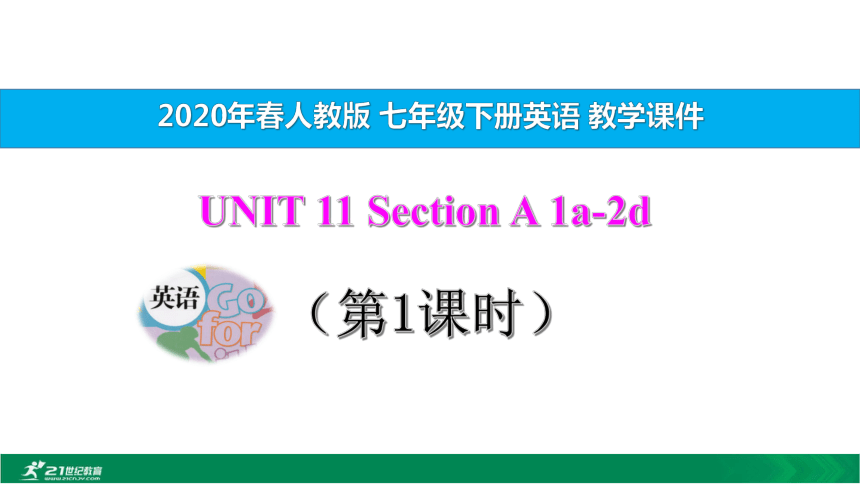 | |
| 格式 | zip | ||
| 文件大小 | 3.9MB | ||
| 资源类型 | 试卷 | ||
| 版本资源 | 人教新目标(Go for it)版 | ||
| 科目 | 英语 | ||
| 更新时间 | 2020-03-30 15:29:15 | ||
图片预览

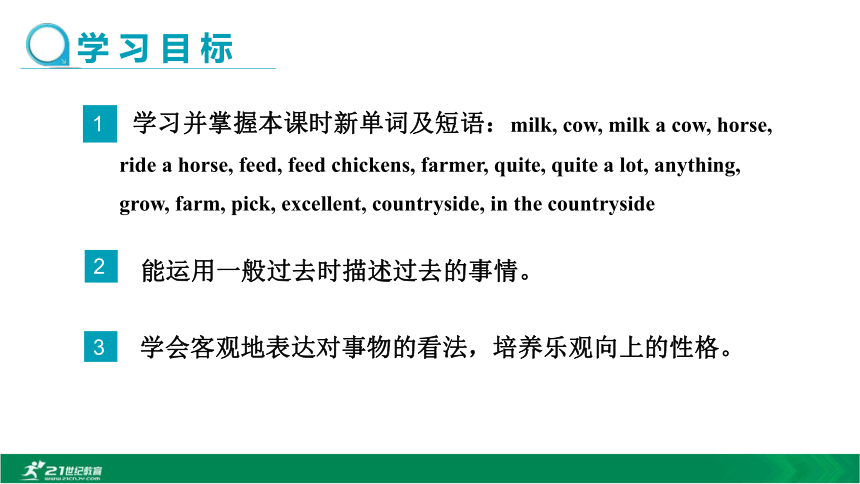
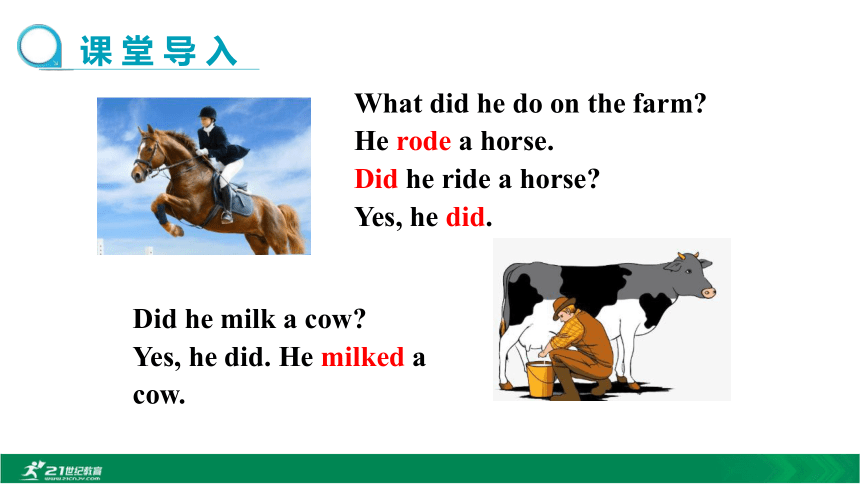
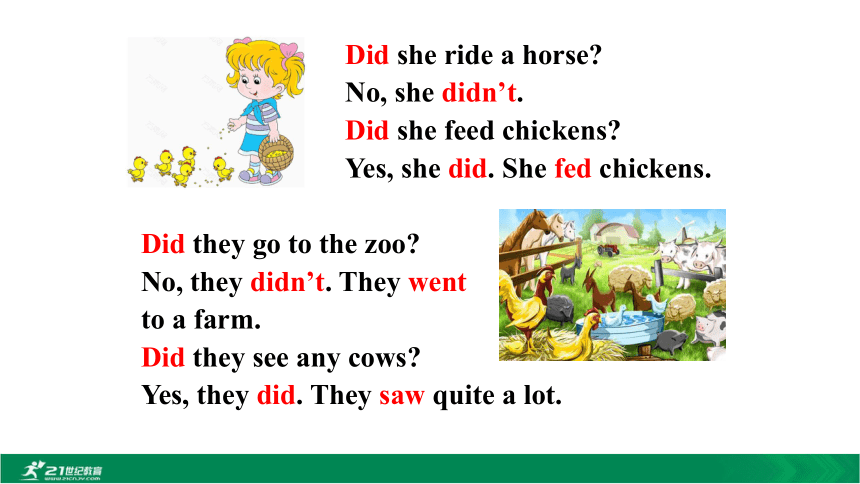
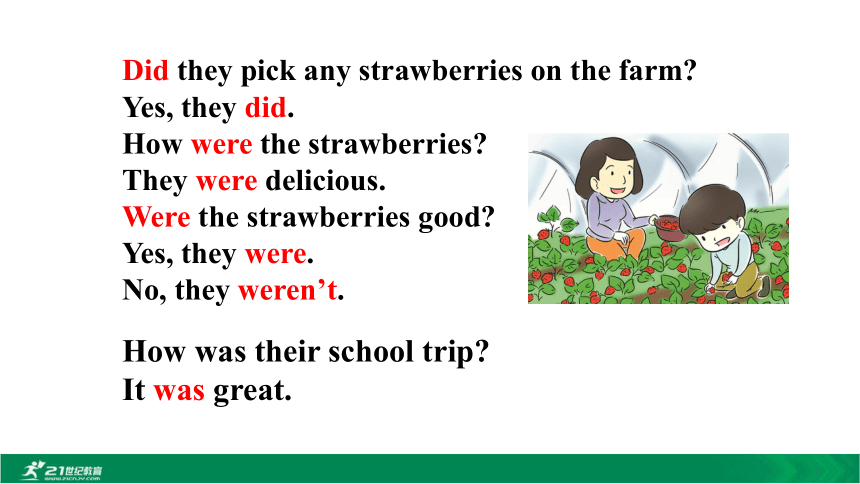
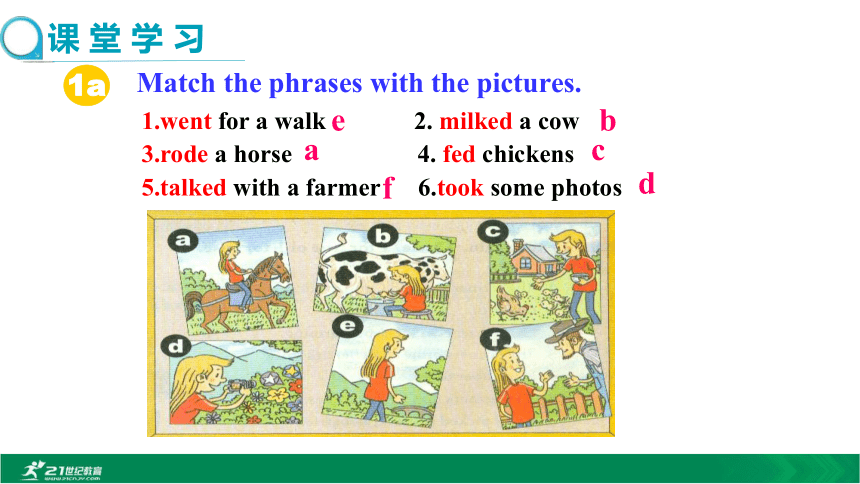
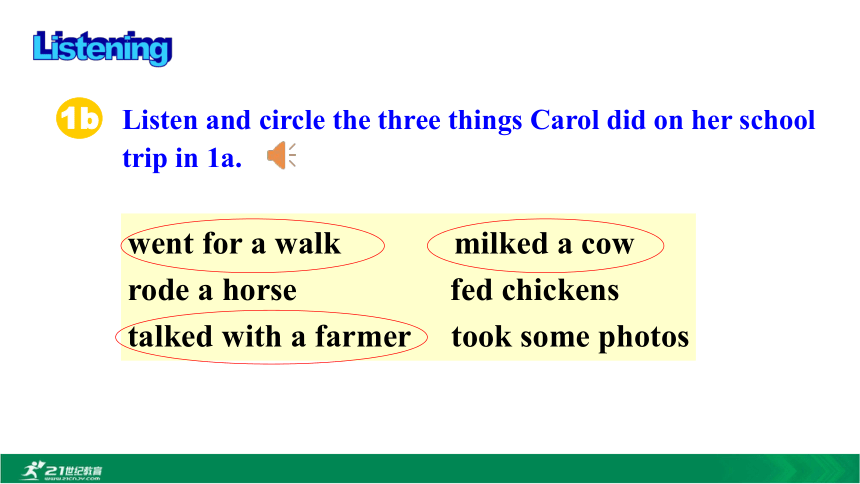
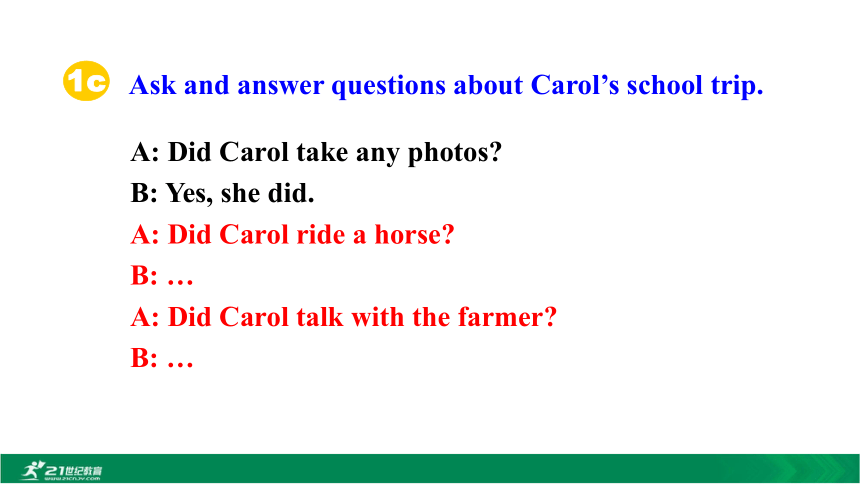
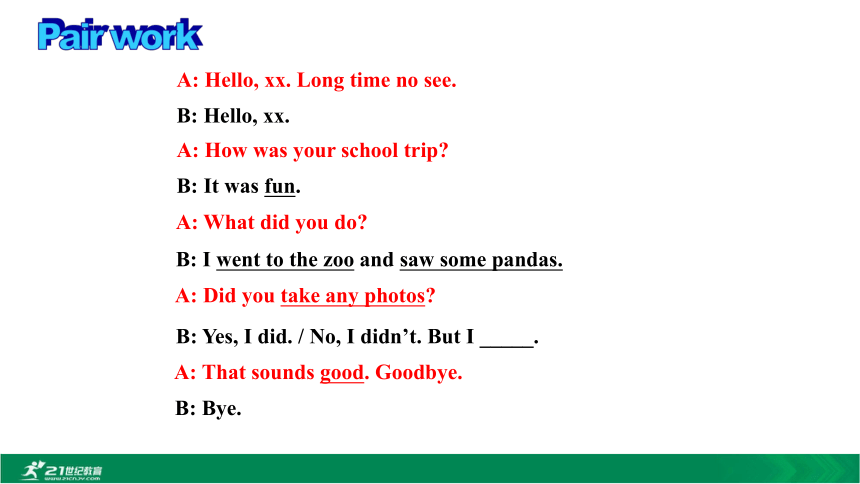
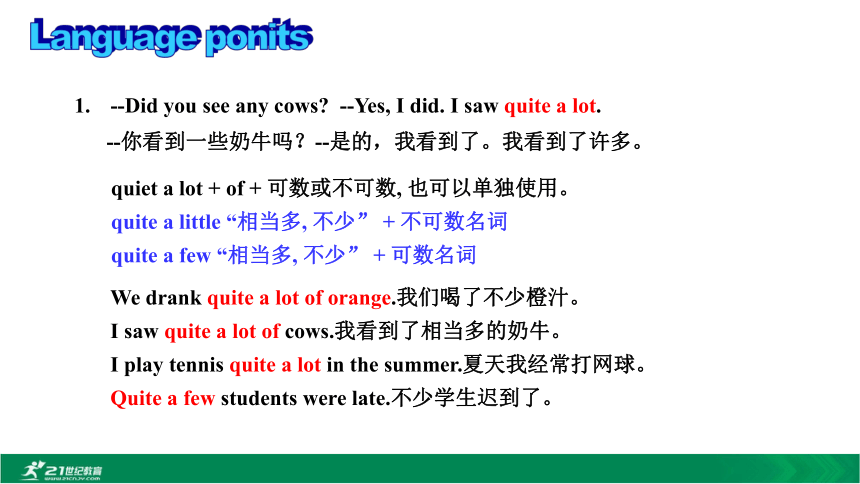
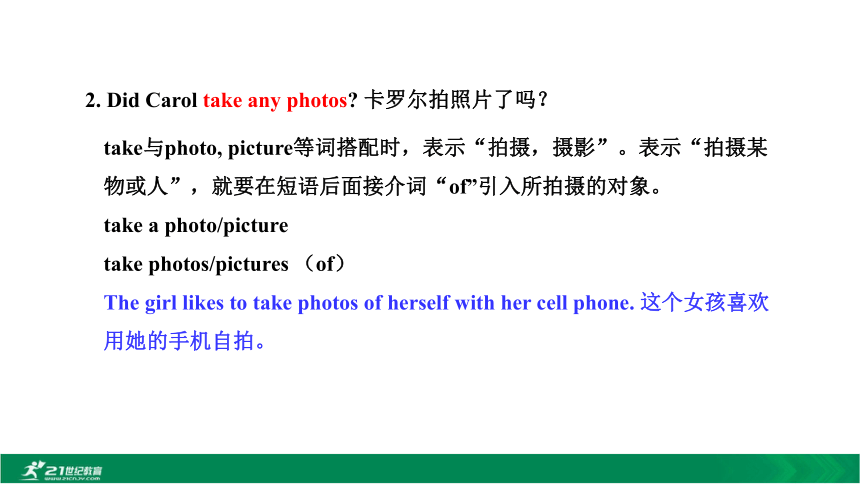
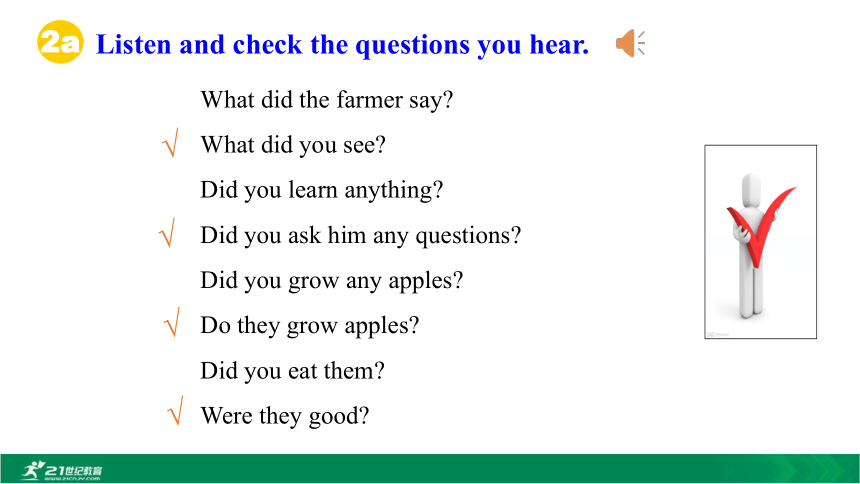
文档简介
课件31张PPT。2020年春人教版 七年级下册英语 教学课件UNIT 11 Section A 1a-2d(第1课时)What did he do on the farm?
He rode a horse.
Did he ride a horse?
Yes, he did.Did he milk a cow?
Yes, he did. He milked a cow.Did she ride a horse?
No, she didn’t.
Did she feed chickens?
Yes, she did. She fed chickens.Did they go to the zoo?
No, they didn’t. They went
to a farm.
Did they see any cows?
Yes, they did. They saw quite a lot.Did they pick any strawberries on the farm?
Yes, they did.
How were the strawberries?
They were delicious.
Were the strawberries good?
Yes, they were.
No, they weren’t.How was their school trip?
It was great. Match the phrases with the pictures. 1.went for a walk 2. milked a cow
3.rode a horse 4. fed chickens
5.talked with a farmer 6.took some photosebacfd1aListen and circle the three things Carol did on her school trip in 1a.went for a walk milked a cow
rode a horse fed chickens
talked with a farmer took some photos1bListeningA: Did Carol take any photos?
B: Yes, she did.
A: Did Carol ride a horse?
B: …
A: Did Carol talk with the farmer?
B: … Ask and answer questions about Carol’s school trip.1cA: Hello, xx. Long time no see.B: Hello, xx. A: How was your school trip?B: It was fun. A: What did you do?B: I went to the zoo and saw some pandas.A: Did you take any photos?B: Yes, I did. / No, I didn’t. But I _____. A: That sounds good. Goodbye.B: Bye. Pair workquiet a lot + of + 可数或不可数, 也可以单独使用。 quite a little “相当多, 不少” + 不可数名词 quite a few “相当多, 不少” + 可数名词--Did you see any cows? --Yes, I did. I saw quite a lot.
--你看到一些奶牛吗?--是的,我看到了。我看到了许多。Language ponitsWe drank quite a lot of orange.我们喝了不少橙汁。
I saw quite a lot of cows.我看到了相当多的奶牛。
I play tennis quite a lot in the summer.夏天我经常打网球。
Quite a few students were late.不少学生迟到了。take与photo, picture等词搭配时,表示“拍摄,摄影”。表示“拍摄某物或人”,就要在短语后面接介词“of”引入所拍摄的对象。
take a photo/picture
take photos/pictures (of)
The girl likes to take photos of herself with her cell phone. 这个女孩喜欢用她的手机自拍。2. Did Carol take any photos? 卡罗尔拍照片了吗?What did the farmer say?
What did you see?
Did you learn anything?
Did you ask him any questions?
Did you grow any apples?
Do they grow apples?
Did you eat them?
Were they good?
Listen and check the questions you hear.√√√√2aanything
anything作不定代词,可意为“某事;某东西”,常用在疑问句或否定句中。something作不定代词,也可意为“某事;某东西”,常用在肯定句中。
I didn’t see anything in the room. 我在屋子里什么也没看见。
I saw something in the room. 我在屋里看见了个东西。Language ponits【拓展】
anything作不定代词,还可意为“任何东西;任何事”。
I’m hungry. I’ll eat anything. 我饿了,随便吃什么都行。 1 The farmer showed Carol around the farm. T F
2 Carol learned a lot about farming. T F
3 The farmers grow strawberries from December
to June. T F
4 The farmers don’t grow apples. T F
5 Carol picked some strawberries
and took them home. T F Listen again. Circle T for true or F for false.2bshow (showed) sb. around 带……四周转转
grow (grew) strawberries 种草莓
from… to…从……到……
pick (picked) strawberries 摘草莓
take (took) sth. home 带……回家Language ponitsA: What did Carol do?
B: She picked some strawberries.
A: Was the farmer friendly?
B: …
A: What did Carol see?
B: …2cAsk and answer questions about Carol’s visit to the farm.A: How was your school trip?
B: It was … (boring/interesting/good/great…)
A: What did you do on the school trip?
B: I went for a walk with my classmates.Practicetook some photoswent for a walkmilked a cowrode a horsefed chickenstalked with a farmerWhere did Eric go last weekend?
He went to the countryside.
Why did he go there?
He visited his grandparents.
What did he do?
He went fishing and fed the chickens.
How was the weather there?
It was great and the air was so clean.Read the conversation and answer the questions.2dWhat did he do at night?
He watched the stars.
How did Eric feel about the trip?
It was excellent. Peter: Hi, Eric. _______ was your trip last week?
Eric: It was exxellent. I _______ my grandparents in the countryside.
Peter: Oh, nice. What ______ you do?
Eric: I ___________ every day. And I fed the chickens with my grandapa. It was so much fun.
Peter: _____________. How was the weather there?
Eric: It was great and the air was so clean. I _________________ at night. They were so beautiful.
Peter: Lucky you.Role-play conversation. How visiteddid went fishingSounds good watched the stars 2d1. I visited my grandparents in the countryside.我去看望了乡下的爷爷奶奶。
(1)visit 表示“拜访,看望,参观”,其宾语可以是人,也可以是地点名词。
visit my teacher = call on my teacher
visit your school = call at your school
(2) in the countryside 在乡下
countryside在此处等同于couontry,都是“乡下,农村”之意,常和冠词 “the” 搭配连用。
We spent a pleasant day in the country.我们在乡下度过了愉快的一天。Language ponits2. I fed the chickens with my grandpa. 我和我爷爷一起喂鸡。
“ feed … with …表示“用……喂……”,此时等于“feed … on …” ,短语中feed是及物动词,其后接人或动物名词作宾语。
A kid fed the monkey on/with a banana.那个小孩用香蕉喂猴子。
fun表示“有趣的事情”,为不可数名词。
Look, Peter. The children are having so much fun.
看,彼得!这些小鸡非常好玩儿。3. It was so much fun. 那非常好玩儿。4. Lucky you! 你真幸运!
这是一句非正式口语,相当于You’re so lucky.
Lucky之后的人称还可以改为me/ him。3. Sounds good. 听起来不错!
此句省略了主语 it, 全句子应该是 it sounds good. 此处sound为系动词,表示“听起来……”其后加形容词。同样用法的单词还有feel, taste, smell, look 等,表示“摸/尝/闻/看……起来”。
This coat feels soft. 这件上衣摸起来很软。
The supper smells delicious. 晚饭闻起来很香。I. 用适当的词填空。1. How ___ your school trip? It was great.
2. How _____ you yesterday?
3. Today is Monday. Yesterday ____ Sunday.
4. What ___ you do the day before yesterday?
____ you ride a horse last week? was were was did Did6. ____ he see any cows on the farm? Yes, he did.
7. Did he milk a cow on the farm? No, he ______.
8. Were the strawberries good? Yes, they ______.
9. Did you see any cows?
Yes, I did. I ___ quite a lot.
10. I ___ the chickens last week. (feed) Did didn’t were saw fedII.根据汉语意思完成下列英语句子或对话,每空一词(含缩略形式)。1. 杰克昨天在公园里散步了。
Jack ____ __ __ ____ in the park yesterday.?????
2. 你和那位农民谈话了吗?
____ you ____ ____ that farmer?
3. 我们在农场上看到许多猪。
We saw ____ __ ___ __ pigs on the farm.went for a walkDid talk withquite a lot of Practice the sentence patterns.
Talk about your school trip and present in the next class.
3. Preview Grammar Focus.Homework谢谢21世纪教育网(www.21cnjy.com) 中小学教育资源网站 有大把高质量资料?一线教师?一线教研员?
欢迎加入21世纪教育网教师合作团队!!月薪过万不是梦!!
详情请看:
https://www.21cnjy.com/help/help_extract.php
He rode a horse.
Did he ride a horse?
Yes, he did.Did he milk a cow?
Yes, he did. He milked a cow.Did she ride a horse?
No, she didn’t.
Did she feed chickens?
Yes, she did. She fed chickens.Did they go to the zoo?
No, they didn’t. They went
to a farm.
Did they see any cows?
Yes, they did. They saw quite a lot.Did they pick any strawberries on the farm?
Yes, they did.
How were the strawberries?
They were delicious.
Were the strawberries good?
Yes, they were.
No, they weren’t.How was their school trip?
It was great. Match the phrases with the pictures. 1.went for a walk 2. milked a cow
3.rode a horse 4. fed chickens
5.talked with a farmer 6.took some photosebacfd1aListen and circle the three things Carol did on her school trip in 1a.went for a walk milked a cow
rode a horse fed chickens
talked with a farmer took some photos1bListeningA: Did Carol take any photos?
B: Yes, she did.
A: Did Carol ride a horse?
B: …
A: Did Carol talk with the farmer?
B: … Ask and answer questions about Carol’s school trip.1cA: Hello, xx. Long time no see.B: Hello, xx. A: How was your school trip?B: It was fun. A: What did you do?B: I went to the zoo and saw some pandas.A: Did you take any photos?B: Yes, I did. / No, I didn’t. But I _____. A: That sounds good. Goodbye.B: Bye. Pair workquiet a lot + of + 可数或不可数, 也可以单独使用。 quite a little “相当多, 不少” + 不可数名词 quite a few “相当多, 不少” + 可数名词--Did you see any cows? --Yes, I did. I saw quite a lot.
--你看到一些奶牛吗?--是的,我看到了。我看到了许多。Language ponitsWe drank quite a lot of orange.我们喝了不少橙汁。
I saw quite a lot of cows.我看到了相当多的奶牛。
I play tennis quite a lot in the summer.夏天我经常打网球。
Quite a few students were late.不少学生迟到了。take与photo, picture等词搭配时,表示“拍摄,摄影”。表示“拍摄某物或人”,就要在短语后面接介词“of”引入所拍摄的对象。
take a photo/picture
take photos/pictures (of)
The girl likes to take photos of herself with her cell phone. 这个女孩喜欢用她的手机自拍。2. Did Carol take any photos? 卡罗尔拍照片了吗?What did the farmer say?
What did you see?
Did you learn anything?
Did you ask him any questions?
Did you grow any apples?
Do they grow apples?
Did you eat them?
Were they good?
Listen and check the questions you hear.√√√√2aanything
anything作不定代词,可意为“某事;某东西”,常用在疑问句或否定句中。something作不定代词,也可意为“某事;某东西”,常用在肯定句中。
I didn’t see anything in the room. 我在屋子里什么也没看见。
I saw something in the room. 我在屋里看见了个东西。Language ponits【拓展】
anything作不定代词,还可意为“任何东西;任何事”。
I’m hungry. I’ll eat anything. 我饿了,随便吃什么都行。 1 The farmer showed Carol around the farm. T F
2 Carol learned a lot about farming. T F
3 The farmers grow strawberries from December
to June. T F
4 The farmers don’t grow apples. T F
5 Carol picked some strawberries
and took them home. T F Listen again. Circle T for true or F for false.2bshow (showed) sb. around 带……四周转转
grow (grew) strawberries 种草莓
from… to…从……到……
pick (picked) strawberries 摘草莓
take (took) sth. home 带……回家Language ponitsA: What did Carol do?
B: She picked some strawberries.
A: Was the farmer friendly?
B: …
A: What did Carol see?
B: …2cAsk and answer questions about Carol’s visit to the farm.A: How was your school trip?
B: It was … (boring/interesting/good/great…)
A: What did you do on the school trip?
B: I went for a walk with my classmates.Practicetook some photoswent for a walkmilked a cowrode a horsefed chickenstalked with a farmerWhere did Eric go last weekend?
He went to the countryside.
Why did he go there?
He visited his grandparents.
What did he do?
He went fishing and fed the chickens.
How was the weather there?
It was great and the air was so clean.Read the conversation and answer the questions.2dWhat did he do at night?
He watched the stars.
How did Eric feel about the trip?
It was excellent. Peter: Hi, Eric. _______ was your trip last week?
Eric: It was exxellent. I _______ my grandparents in the countryside.
Peter: Oh, nice. What ______ you do?
Eric: I ___________ every day. And I fed the chickens with my grandapa. It was so much fun.
Peter: _____________. How was the weather there?
Eric: It was great and the air was so clean. I _________________ at night. They were so beautiful.
Peter: Lucky you.Role-play conversation. How visiteddid went fishingSounds good watched the stars 2d1. I visited my grandparents in the countryside.我去看望了乡下的爷爷奶奶。
(1)visit 表示“拜访,看望,参观”,其宾语可以是人,也可以是地点名词。
visit my teacher = call on my teacher
visit your school = call at your school
(2) in the countryside 在乡下
countryside在此处等同于couontry,都是“乡下,农村”之意,常和冠词 “the” 搭配连用。
We spent a pleasant day in the country.我们在乡下度过了愉快的一天。Language ponits2. I fed the chickens with my grandpa. 我和我爷爷一起喂鸡。
“ feed … with …表示“用……喂……”,此时等于“feed … on …” ,短语中feed是及物动词,其后接人或动物名词作宾语。
A kid fed the monkey on/with a banana.那个小孩用香蕉喂猴子。
fun表示“有趣的事情”,为不可数名词。
Look, Peter. The children are having so much fun.
看,彼得!这些小鸡非常好玩儿。3. It was so much fun. 那非常好玩儿。4. Lucky you! 你真幸运!
这是一句非正式口语,相当于You’re so lucky.
Lucky之后的人称还可以改为me/ him。3. Sounds good. 听起来不错!
此句省略了主语 it, 全句子应该是 it sounds good. 此处sound为系动词,表示“听起来……”其后加形容词。同样用法的单词还有feel, taste, smell, look 等,表示“摸/尝/闻/看……起来”。
This coat feels soft. 这件上衣摸起来很软。
The supper smells delicious. 晚饭闻起来很香。I. 用适当的词填空。1. How ___ your school trip? It was great.
2. How _____ you yesterday?
3. Today is Monday. Yesterday ____ Sunday.
4. What ___ you do the day before yesterday?
____ you ride a horse last week? was were was did Did6. ____ he see any cows on the farm? Yes, he did.
7. Did he milk a cow on the farm? No, he ______.
8. Were the strawberries good? Yes, they ______.
9. Did you see any cows?
Yes, I did. I ___ quite a lot.
10. I ___ the chickens last week. (feed) Did didn’t were saw fedII.根据汉语意思完成下列英语句子或对话,每空一词(含缩略形式)。1. 杰克昨天在公园里散步了。
Jack ____ __ __ ____ in the park yesterday.?????
2. 你和那位农民谈话了吗?
____ you ____ ____ that farmer?
3. 我们在农场上看到许多猪。
We saw ____ __ ___ __ pigs on the farm.went for a walkDid talk withquite a lot of Practice the sentence patterns.
Talk about your school trip and present in the next class.
3. Preview Grammar Focus.Homework谢谢21世纪教育网(www.21cnjy.com) 中小学教育资源网站 有大把高质量资料?一线教师?一线教研员?
欢迎加入21世纪教育网教师合作团队!!月薪过万不是梦!!
详情请看:
https://www.21cnjy.com/help/help_extract.php
同课章节目录
- Unit 1 Can you play the guitar?
- Section A
- Section B
- Unit 2 What time do you go to school?
- Section A
- Section B
- Unit 3 How do you get to school?
- Section A
- Section B
- Unit 4 Don't eat in class.
- Section A
- Section B
- Unit 5 Why do you like pandas?
- Section A
- Section B
- Unit 6 I'm watching TV.
- Section A
- Section B
- Review of Units 1-6
- Unit 7 It's raining!
- Section A
- Section B
- Unit 8 Is there a post office near here?
- Section A
- Section B
- Unit 9 What does he look like?
- Section A
- Section B
- Unit 10 I'd like some noodles.
- Section A
- Section B
- Unit 11 How was your school trip?
- Section A
- Section B
- Unit 12 What did you do last weekend?
- Section A
- Section B
